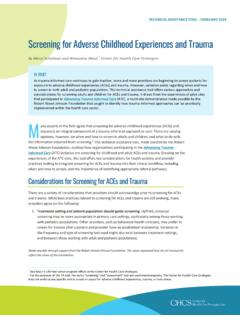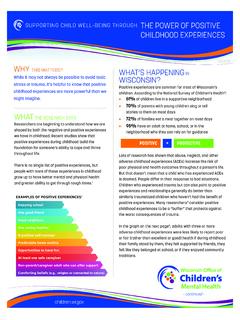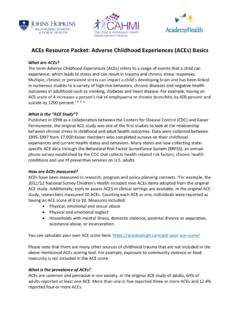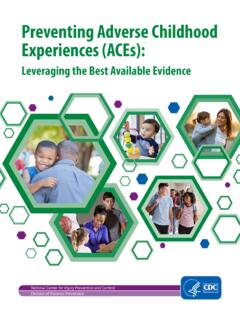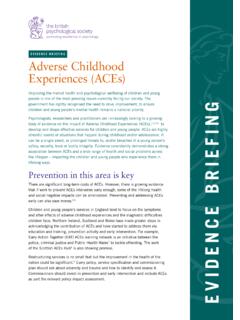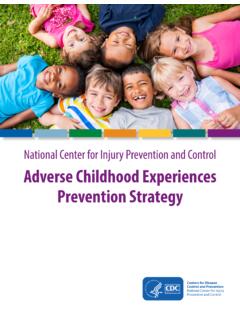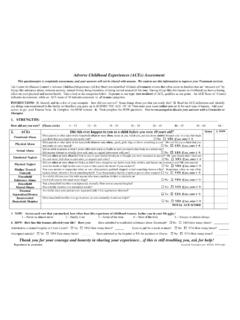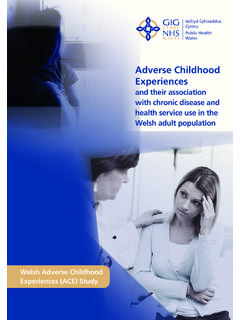Transcription of Fact Sheet Adverse Childhood Experiences (ACEs)
1 Adverse Childhood Experiences (ACEs) Fact Sheet Free Downloadables from the Blog Post Include: One Page Summary of the Science List of References ACE Survey to Calculate Your ACE Score Veronique Mead, MD, MA Chronic Illness trauma Studies v. July 21, 2019 * includes UPDATES from a spring 2018 email conversation with Dr. Felitti who Recommends: -an 11th ACE question (since the first 10 do not cover all types of trauma ) -statistics update that ACEs screened with over 450,000 patients at Kaiser You can share the ACE Facts Under the CC BY-NC-ND creative commons license: You are welcome to share any of the pages here with the requirement that you not share for money or profit and that you link to the companion blog post and / or cite the source.
2 Veronique Mead, MD, MA Chronic Illness trauma Studies ACE Fact Sheets to Educate Your Doctor These pages are a work in progress and I invite you to contact me with recommendations or feedback so this original source can be updated periodically. I. Adverse Childhood Experiences (ACEs) Studies The Adverse Childhood Experiences (ACE) studies show that trauma in Childhood increases risk for chronic disease; 1 fractures and injuries; depression, anxiety, PTSD and other mental health conditions; a greater risk of giving birth prematurely; and other life challenges. 2 These problems also affect future generations. A Kaiser-CDC study with over 17,000 participants identified this connection.
3 Results have been reproduced in other studies with different populations 3 and a continuation of the original study with over 450,000 patients *. The key point from this body of research is that the effects of Childhood trauma are not just psychological. trauma alters brain development, function and structure; autonomic nervous system regulation; physiology, stress responses 4-6 , and gene function (epigenetics) 7 . The American Academy of Pediatrics has used this and other research to develop a new policy 4 , assessment tools , and a trauma toolbox for primary care. For more info: WHO , CDC 8 , RWJ , PBS 9 , NPR 10 , New York Times 11 , CBS 60 minutes, and news site ACES Too High.
4 II. ACEs Increase Risk for Mental Illness, Major Causes of Death & More 2,12 ACEs increase risk for major causes of death in adults including smoking, alcohol abuse (7X greater risk of abusing alcohol), use of illicit drugs (10X), suicide attempts (12X), promiscuity, obesity, physical inactivity. ACES also increase: risk for chronic illness, cancer, fractures, heart / lung / thyroid / autoimmune (more on website ) 1 ADHD & behavior problems in kids [23]; premature birth, greater challenges / difficulties in parenting anxiety, depression, PTSD, self-harm , suicide, low life satisfaction, poor academic achievement unintended pregnancy & paternity, intimate partner violence, increased number of marriages injuries, intentional and not ie motor vehicle accidents/shootings/stabbings 13 & criminality 14 III.
5 ACE Score: 1 point per category experienced before 18 yo for max of 10 2 The ACE questionnaire asks about exposure to 10 specific types of trauma from 0-18 years of age. Original Qs were drawn from areas in public health for which national programs were being developed in the 1990s. Other types of trauma also increase risk (accidents, unsafe neighborhood, etc). 1 point for any event per category. 1 _ Physical abuse (Stats: 1 in Americans) 2 _ Sexual abuse (1 in 5) 3 _ Emotional abuse (1 in 9) 4 _ Physical neglect 5 _ Emotional neglect 6 _ Loss of a parent from divorce or separation 7 _ Violent treatment of mother (1 in 10) 8 _ Member of household mental illness (1 in 5) 9 _ Member of household jailed (1 in 30) 10 _ Member of household substance abuse (1 in 4) IV.
6 ACE & Chronic Illness Facts & Stats 63% of population In has ACE score 1; 25% an ACE score of 2; ACE 4 2 (see CDC ) Life expectancy Is 20 years shorter with ACE 6 2 ; premature death 2x higher ACE 4 15 Dose responseRisk goes up with more ACEs 2 ; age at symptom onset decreases 6 Depression Severity increases in adolescents with increasing score from 0 to 3 points 6 Violence Offenders have greater history of ACEs. Each point increases risk 14,16 AddictionsHigher with ACEs regardless of drug availability, public opinion or spending 17 MultigenerationalMaternal ACE increase child s risk physical & emotional health conditions 4,18 TreatmentWhen Drs ask about ACEs it validates, removes blame 19,20 , & offers new tools Book& How ToACEs Overview & how one medical Dr screens for ACEs: The Deepest Well 21 Autoimmune disease20% increased risk with each additional point in ACE score 1.
7 A recovery story 22 Hospitalizations 70% higher for autoimmune disease with ACE of 2 vs ACE of 0 1 Veronique Mead, MD, MA ( CC BY-NC-ND ) for more see Chronic Illness trauma Studies ACE Fact Sheet References 1. Dube SR, Fairweather D, Pearson WS, et al. Cumulative Childhood Stress and Autoimmune Diseases in Adults. Psychosom Med 2009;71(2):243-50. 2. Felitti VJ, Anda RF, Nordenberg D, et al. Relationship of Childhood abuse and household dysfunction to many of the leading causes of death in adults. The Adverse Childhood Experiences (ACE) Study [see comments]. Am J Prev Med 1998;14(4):245-58. 3. Hughes K, Bellis MA, Hardcastle KA, et al.
8 The effect of multiple Adverse Childhood Experiences on health: a systematic review and meta-analysis. Lancet Public Health 2017;2(8):e356-e66. doi: (17)30118-4 4. Shonkoff JP, Garner AS, Committee on Psychosocial Aspects of C, et al. The lifelong effects of early Childhood adversity and toxic stress. Pediatrics 2012;129(1):e232-46. doi: 5. Garner AS, Shonkoff JP, Committee on Psychosocial Aspects of C, et al. Early Childhood adversity, toxic stress, and the role of the pediatrician: translating developmental science into lifelong health. Pediatrics 2012;129(1):e224-31. doi: 6. Luby JL, Barch D, Whalen D, et al. Association Between Early Life Adversity and Risk for Poor Emotional and Physical Health in Adolescence: A Putative Mechanistic Neurodevelopmental Pathway.
9 JAMA Pediatr 2017 doi: 7. Romens SE, McDonald J, Svaren J, et al. Associations between early life stress and gene methylation in children. Child Dev 2015;86(1):303-9. doi: 8. CDC (Centers for Disease Control and Prevention). Adverse Childhood Experiences (ACEs) [website]. CDC; 2016 [CDC 24/7: Saving Lives, Protecting People:[Available from: accessed Nov 2, 2016 2016. 9. Bouffard K. Why stress may be fueling the Childhood asthma epidemic. Health (N Y). : 1996-2016 PBSNewsHourproductions LLC, 2015. 10. Starecheski L. 10 Questions Some Doctors Are Afraid To Ask. National Public Radio: What Shapes Health. Washington, : National Public Radio (NPR), 2015:NPR Science Desk: Shots.]]
10 11. Bornstein D. Putting the Power of Self-Knowledge to Work (Part III of III). The New York Times 2016 August 23. 12. Bellis MA, Hughes K, Leckenby N, et al. Measuring mortality and the burden of adult disease associated with Adverse Childhood Experiences in England: a national survey. J Public Health (Oxf) 2015;37(3):445-54. doi: 13. Su S, Wang X, Pollock JS, et al. Adverse Childhood Experiences and blood pressure trajectories from Childhood to young adulthood: the georgia stress and heart study. Circulation 2015;131(19):1674-81. doi: 14. Kajeepeta S, Gelaye B, Jackson CL, et al. Adverse Childhood Experiences are associated with adult sleep disorders: a systematic review.
